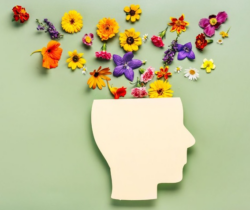Unlocking Wellness: Help for Mental Health

Even before the strain on mental health caused by the Covid-19 pandemic, a significant number of American women were already prioritizing self-care and well-being.
The mental health crisis is a complex and multifaceted issue that has been escalating in recent years. Statistics reveal that anxiety, depression, and insomnia remain rising concerns, especially among younger women.
Emotional wellness, with an emphasis on stress management, is becoming an increasingly common focus in the U.S., incorporating a wide range of approaches from herbal supplements to therapy to athletic pursuits.
A shift toward holistic mental health care is gaining traction. Practices such as meditation, exercise, and nutrition are being recognized as potential components of mental well-being. Mental health is increasingly seen as interconnected with spiritual and physical health, and comprehensive approaches that address all aspects are growing in popularity.
The best treatment for any disease is to prevent it. In recent decades, meditation has become a key part of many self-care strategies. The Transcendental Meditation (TM) technique stands out as one of the most effective methods for both prevention and treatment. The experience of transcending reduces many physical imbalances that promote mental disease and simultaneously cultures infinite stability and adaptability in the mind.
Extensive research supports reported benefits of TM, making it one of the most scientifically validated meditation practices and a smart choice to support mental health.
A 2023 article in Vogue reported,
“What was once seen, a half century ago, as a kind of vague spiritual quest undertaken by hippies, seekers, and weirdos—and, you know, the Beatles, who made their famous pilgrimage to India to study Transcendental Meditation with the Maharishi Mahesh Yogi in 1968—has become a movement of 10 million people around the world who rely on TM for its proven benefits (in hundreds of peer-reviewed scientific papers and more than a dozen major clinical trials) in reducing stress, tension, and anxiety; improving sleep and reducing insomnia; lowering blood pressure and reducing the chance of heart attacks and strokes; and boosting neuroplasticity and cell rejuvenation in the brain, for starters…. The process simply works, whether you even believe in it or not.”
There’s a growing emphasis on the importance of preventing mental health issues before they escalate. This includes integrating mental health education into schools, offering early intervention services, and promoting strategies for reducing stress and building resilience. Making the most effective choice among potential strategies is crucial.
An article by a doctor on Psychology Today’s website in 2021 stated
“In my view, the best way to categorize each of the various types of meditation is based on the EEG patterns produced in the brain during its practice. The subjects who practiced Automatic Self-Transcending (TM in this study) lived longer and had better improvement in their systolic blood pressure, cognitive flexibility, mental health, and self-ratings of aging…. Transcendental Meditation technique fosters significantly greater self-actualization.”
The epidemic of stress in the U.S. is largely responsible for the increase in mental health challenges. Cortisol, an enzyme produced by the adrenal glands, is considered the hallmark of a stress response. The TM technique actually reduces stress, and correspondingly, cortisol. To cite just one study: Your body produces cortisol, a.k.a. the stress hormone, at a rate that’s 30 to 40 percent less during Transcendental Meditation than normal—when you sleep, by comparison, it only drops 10 percent.
A 2013 study, appearing in Military Medicine, listed Transcendental Meditation as a feasible treatment for post-traumatic stress disorder (PTSD) in active-duty military personnel. Similarly, a study appearing in The Permanente Journal in 2014, concluded that the TM program was effective in reducing psychological distress in teachers. A 2016 study from the same journal found significant reductions in symptoms of trauma, anxiety, and depression in prison inmates who practiced TM.
Mental health, like physical health, is an integral component of overall well being. Health education can be offered in schools and colleges, in corporate settings, within the military and in other institutions. The TM program is the perfect fit in all cases as it is universally simple to learn and practice. The technique is based on the natural ability to think a thought, so even children, individuals with ADHD or PTSD symptoms, and people struggling with anxiety, depression or other mental challenges can practice it effectively.
It’s important for total wellbeing to prioritize your mental health, whether you’re going through a difficult period now or just want to strengthen your mental robustness. Your local TM teacher will be happy to provide this powerful tool for unfolding profound authentic self-reliance.
“In the middle of winter I at last discovered that there was in me an invincible summer.”
— Albert Camus
Connect with a certified TM teacher near you.
About the Author
Janet Hoffman is the executive director of TM for Women Professionals, a division of TM for Women in the USA
Vanessa Vidal is the national director of TM for Women in the USA





